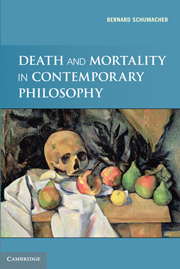Preface
Published online by Cambridge University Press: 05 June 2012
Summary
Preface
In order to safeguard his happiness, contemporary Western man has contrived to stop thinking at all about death and, more particularly, about his own death, to deny it in a way by maintaining a stony silence with regard to it. Some philosophers end up taking part in this masquerade by considering the subject taboo or by declaring that it is not philosophical. Whereas the act of philosophizing was understood in the philosophical tradition as a preparation for death, as a rumination on life and death, many contemporary philosophers set aside the very question of man’s relation to “his own death”. Does this habit of averting their eyes originate in a fear of death? Is it due to a shift of attention away from radical questions concerning the meaning and ultimate foundation of human life, in both its personal and its social dimension, so as to focus on particular and local problems? Whatever the reason, it seems that philosophy would have everything to gain if it once again centered its theoretical and practical reflections on such fundamental themes, for they are at the heart of human existence.
When they heard that I was writing a book on death, most of my colleagues smiled ironically; they just couldn’t understand how a young philosopher could “waste” several years of his life meditating on death, given that the subject eludes all philosophical investigation and there is no hope whatsoever of arriving at definitive answers. But isn’t philosophy, in some sense, a waste of time? Like true leisure and love, philosophy cannot be evaluated in terms of profitability, and I am glad that I devoted time to contemplating a philosophical subject that of course continues to elude me but that nonetheless is evident under the aspects of the incomprehensible and the frontier.
- Type
- Chapter
- Information
- Death and Mortality in Contemporary Philosophy , pp. ix - xiiPublisher: Cambridge University PressPrint publication year: 2010

